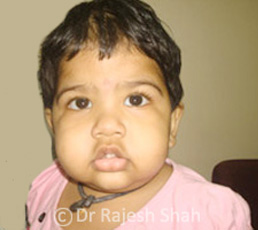 Nephrotic Syndrome in Children is a condition of the kidney in which more protein is lost through the urine. Depending on the cause, this may just be temporary or may be a sign of kidney damage. Children below the age of 5 years are more likely to develop Nephrotic Syndrome. Girls are less likely to develop Nephrotic Syndrome as compared to boys.
Nephrotic Syndrome in Children is a condition of the kidney in which more protein is lost through the urine. Depending on the cause, this may just be temporary or may be a sign of kidney damage. Children below the age of 5 years are more likely to develop Nephrotic Syndrome. Girls are less likely to develop Nephrotic Syndrome as compared to boys.
What are the signs and symptoms of Nephrotic Syndrome in Children?
The following signs and symptoms are commonly seen in children suffering from Nephrotic Syndrome:
- Swelling of feet or ankles may be noticed. Rarely, swelling may also be noticed on the face or in the hands. Sometimes, there may be a swelling of the abdomen which may lead to difficult breathing if severe.
- You may notice that your child is more tired, more irritable than earlier and also looks paler.
- Your child may visit the washroom less frequently to pass urine. Occasionally, blood may also be seen in your child’s urine.
- Some children with Nephrotic Syndrome may develop symptoms of infection like fever, tummy pain, loose motions, lack of appetite or high blood pressure.
What tests are done to diagnose Nephrotic Syndrome in children?
If your doctor suspects that your Child has Nephrotic Syndrome after listening to the symptoms and examining your child, you may be asked to get certain tests done:
Urine Tests – Your child’s urine test may reveal a high level of the protein called Albumin. Rarely, blood may also be seen. Certain tests may also be advised to check urine for a period of 24 hours.
Blood Tests – Blood Tests may be done to check levels of Creatinine, Protein, Electrolytes, BUN.
Sonography – This is a painless imaging test which helps the doctor study any damage to your kidneys.
Biopsy – Sometimes, your doctor may ask for a tiny sample of tissue to be removed from the kidney so that it can be analysed under the microscope.
What is the Nephrotic Syndrome Treatment for Children?
- Certain medications called Diuretics may be given to reduce your child’s swelling. These work by removing the additional fluid collected in the body by means of urine. Medications may also be required to lower the raised blood pressure.
- The most common treatment is steroid medications which aim to stop the loss of proteins. However, these steroids can have a number of side effects including weight gain, hyper activity, mood swings, stunted growth rate etc.
- Certain other immunosuppressant medications may be prescribed if steroids cause side effects which are too uncomfortable or do not help enough.
Dr Shah’s advice on Homoeopathic Nephrotic Syndrome Treatment in Children:
Dr Rajesh Shah has found homoeopathic treatment to be extremely effective for Nephrotic syndrome treatment for children at Lifeforce Homoepathy. Homoeopathic treatment aims to reduce the severity, duration and frequency of the recurrent episodes of nephrotic syndrome and to reduce the dependency on steroids.




